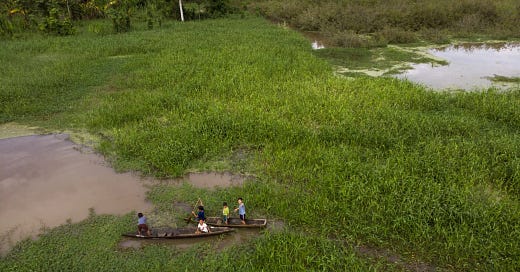No. 52: PRIDE
LGBTQ+ Intersectionality / Women Empowerment / "Decolonizing your Diet" / Ecological Restoration / The U.S. Supreme Court V. Wetlands / East Coast Smoke
Happy PRIDE MONTH Regenerative School Community,
It is JUNE! Embracing diversity, equality, and social justice is essential for both the LGBTQ+ rights movement and the environmental movement to create a more inclusive and sustainable future for us all.
Today, we come to your inbox bearing some breaking news, thoughtful essays, and inspiring reads. These recommendations will hopefully help us ease into a more regeneartive mindset, show up in our community, take some deep breaths, and continue to do the important work that is collective compassionate action.
Stay tuned for more Rē School offerings and updates on Friday, June 16th.
Deep gratitude for you wherever and however you are,
The Rē Team
P.S. If anyone’s inner landscape needs some attention this weekend, we recommend tuning in to this quick breath practice.
“The Incredible Disappearing Doomsday,” by Kyle Paoletta for Harpers is a fascinating essay on the evolution of the media’s climate narratives over the years—from apocalyptic to “fine”—and investigates where reality falls. Great read!
Jill Lepore’s “What We Owe Our Trees” for the New Yorker examines our relationships with trees. Forests have fed us and housed us since the rise of man, but how can they provide for us if we do not protect them?
Two great conversations were shared by Atmos this month: one between adrienne maree brown and Prentis Hemphill on “Restoring Our Rhythm,” embodiment, and re-wilding the self, and the other between Madeleine Gregory and Claudia Serrato on “Decolonizing Your Diet.”
“Empowering Women is Key to Breaking the Devastating Cycle of Poverty & Food Insecurity in sub-Saharan Africa” is an opinion piece penned by Danielle Nierenberg and Emily Payne this month. While public policies frequently overlook gender-specific needs and equality issues, emerging networks are leading the way toward women empowerment and are proving essential to ending the cycle of poverty and food insecurity. Click here to learn more.
“‘This Land is Our Life’: Indigenous Shipibo-Konibo-Xetebo People Defend Forest From Illegal Destruction in Peru” by Olivia Rosane for The Real News Network reports on the communities participating in La Guardia Indigena—or the Indigenous Guard—to protect around 8 million hectares in the Ucayali region of Peru. They have an important message for American civilians and nonprofits. . . click here to find out what it is.
After their town was devastated by floods in 2004, residents of Kiday in the Philippines shifted to organic methods when rebuilding their farms. Keith Anthony S. Fabro writes for Mongabay News about the Kiday Community Farmers’ Association practices, challenges, and future. Click here to read more.
Twilight Greenway reports on how members of a California farmworkers are struggling to maintain access to their community garden. Similar stories are unfolding across the country. Click here to learn more about Tierras Milperas and other food collectives.
Reduce! Reuse! Recycle! A new study from the University of Florida has found that curbside recycling is an effective climate tool to help small cities reach their climate goals! Click here to learn more from Katie Myers at Grist.
Warming water and other factors have been killing kelp across the Salish Sea. For millennia, this large brown algae has been vital to coastal Indigenous peoples as a traditional food source and critical habitat for important species. Hakai Magazine’s Natalia Mesa explores how the Jamestown S’Klallam Tribe is “Preparing for the Worst with a Kelp Seed Bank” in Washington State.
Laura J. Martin, an environmental historian, just published “Wild by Design: The Rise of Ecological Restoration,” and we can’t wait to pick it up. The new book delves into the history, science, and philosophy of designing wild places and protecting species. Martin chronicles how restoration’s past provides vital knowledge for future climate change policy and offers a meditation on what it means to be wild.
Do you ever wonder how the cowboys are doing? To Learn about how the Los Charros Foundation is combating the diminishing ranching lifestyle in the shadow of Arizona’s decades-long drought, we recommend Emma Peterson’s thoughtful reporting for Inside climate News.
Last Thursday, the Supreme Court curtailed the Environmental Protection Agency’s authority to police millions of acres of wetlands, delivering another setback to the agency’s ability to combat pollution. While we eagerly await congress to step in and protect the Clean Water Act, we suggest catching up on Adam Liptak’s reporting for the New York Times.
According to Heatmap News, the East Coast has been smokier than the West Coast this year. Click here to learn why and read more about AQI scores and the air you breathe.
“China’s annual emissions are more than double those of the United States, and it is set to surpass U.S. historic emissions by 2050, making it the most important single actor in determining whether the world can avert the worst effects of climate change,” write Michael Birnbaum and Christian Shepherd for the Washington Post. Click here to read “how the U.S. wants to pressure China to help avert climate catastrophe.”
Rē’s director Ashlei Laing went LIVE on Instagram this week to introduce Catherine Kulik, Daniela Currie-Gutierrez, and Emily White, our incredible guides for our upcoming Puerto Rico RēTour. We cannot wait to unlearn to relearn about the truth of American colonization, the power of community, Puerto Rico’s rich culture and deep ecological history of this close-by island. Click here to join the conversation and visit this link to save your spot!
That’s all for this week! We will see you on June 16th with more Rē School updates and offerings!
What have you been reading? What have you been listening to? Write to us at admin@regenerativeschool.org and let us know.
Thank you and see you soon!
The Rē Team







